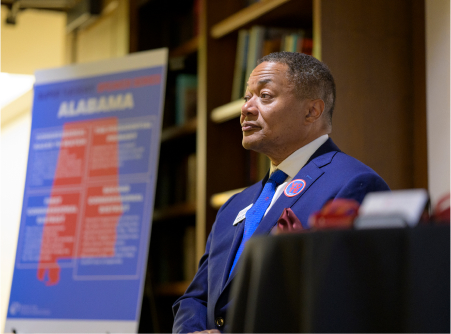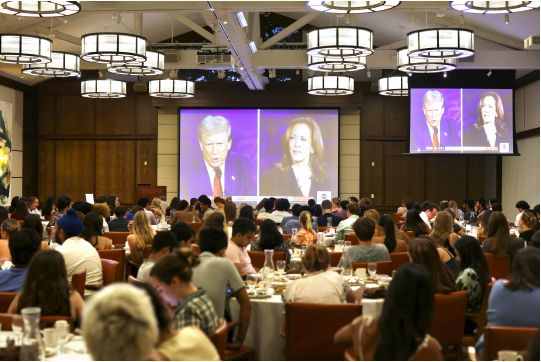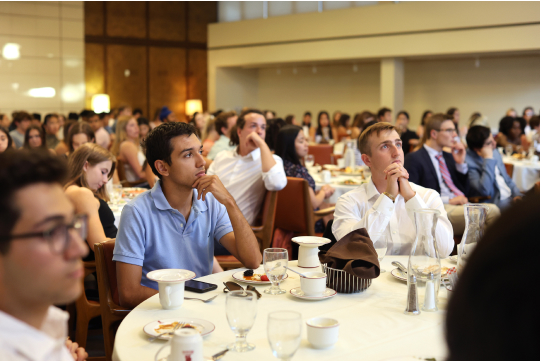CMC students have another important tool for learning about the fundamentals of democracy, government, and constructive dialogue this academic year: The Kravis Lab for Civic Leadership.
The new initiative, which seeks to enhance civic readiness so students are prepared for roles of responsible leadership, is driven by “a desire to build the knowledge, habits, and skills needed to be thoughtful and engaged members of a democratic society,” said Executive Director Vernon C. Grigg III.
The seeds were planted during the spring semester with the launch of Kravis Lab’s Civitas Sessions, which pair Grigg with a CMC faculty, staff member, or invited guest for an Ath lunchtime dialogue over a variety of back-to-basics topics. Past conversations include Professor George Thomas discussing the structure of the Constitution and gaps in the creation of the American government, Professor Ioannis Evrigenis explaining the power of the Declaration of Independence, and Nyree Gray, Vice President of Human Relations and Chief Diversity Officer, dissecting the fundamentals of employment law. The Kravis Lab was also front and center in the construction of a March “Super Tuesday” event featuring multiple professors presenting at the Ath on topics like primary reform, gerrymandering, and (along with Rose Institute students) California ballot measures.
In addition to the Civitas Sessions, Kravis Lab is working on growing projects like the Claremont Initiative for Voter Engagement Strategies (CIVES), a nonpartisan student-run program about voter education, engagement, and registration, and Student Connection, a peer-based tutoring and mentoring program for local K-12 students.
Grigg said Kravis Lab’s momentum into this Presidential election year is an especially intentional mix of what drives The Open Academy—freedom of expression, viewpoint diversity, and constructive dialogue—CMC’s mission of preparing responsible leaders, and applied learning from a multifaceted liberal arts education. The goal, he said, is to bring additive value to practical academic strengths at CMC by capitalizing on “the embarrassment of riches” with faculty and staff expertise already on campus. As students walk across the graduation stage, Grigg wants to know that he did his part to set them up to understand how the world—big and small, national and local—operates.
“A responsible leader helps improve things by understanding and engaging the systems that matter to bring about positive change. It can’t just be about grievances,” said Grigg, who joined CMC in 2022. “Because while we all may be frustrated with some aspect of the world, at a really, really high level, there are so many paths built into our institutions to make life better and bring about the changes that matter. In fact, it’s happening on Tuesday nights at community centers and at school board meetings all over this country. It’s right down your street.”
Grigg recalls the first time he made that connection himself—though he didn’t quite know the personal impact at the time. Growing up in a military family that transferred from Charlotte, N.C. to Kearney, Neb. during the late ’60s, Grigg remembers his dad getting dressed up in his full military uniform for a night out. When a 6-year-old Grigg asked why, his dad told him they were going to a school board meeting.
The subject: Whether young Vernon and his sister, both Black, would attend school with white students in Kearney, which still hadn’t desegregated its classrooms more than a decade after the Brown v. Board of Education ruling.
“And I remember thinking, ‘Oh, they have meetings where people talk about school? Why?’” Grigg said. “But at the time, I was too young to see it for what it really was … That was an early lesson in civics—my parents showed up and made their voice heard as part of an engaged community—all for my benefit.” The result: He and his sister attended school with everyone else and never knew of the controversy until years later.
A graduate of Yale Law School who has worked as a trial lawyer, civil servant, nonprofit CEO, and professor, Grigg said he has always held democracy and elections as core values. Early in his career, he set up the court that heard challenges around the first free and fair elections in South Africa when Nelson Mandela was elected. Grigg hopes CMC students can get the same benefit of turning knowledge into action—and see civic engagement and leadership as a “true calling”—through a variety of Kravis Lab offerings.
“Everything we’re doing is to empower our students as citizen-leaders. We want to give them a better understanding of the institutions and systems that are central to our lives—and the skills to use them,” Grigg said. “That can occur in your dormitory. It can occur in Claremont. It can occur in Los Angeles, Washington, D.C., any city in the country. But first, you have to know how the institutions and systems work—and then it’s up to you to make it work for others.”


